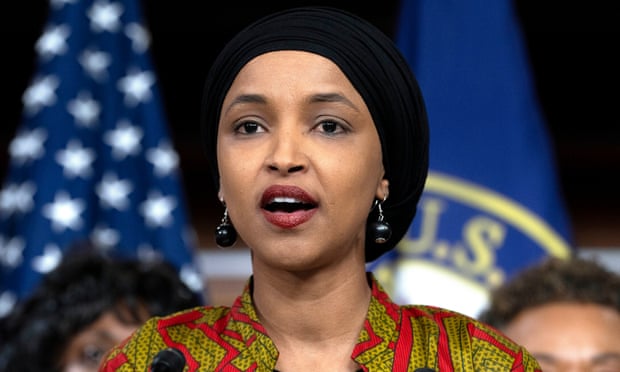The American Israel Public Affairs Committee has declined to seriously target Omar after helping unseat Reps. Cori Bush and Jamaal Bowman.
Rep. Ilhan Omar (D-Minn.) speaks to reporters last year on Capitol Hill. (Ricky Carioti/The Washington Post)Rep. Ilhan Omar (D-Minn.) won her Democratic primary for reelection Tuesday and avoided the fate of two colleagues in the House’s liberal “Squad” who lost earlier this year after pro-Israel groups heavily targeted them.
Omar had 56 percent of the vote when the Associated Press projected her victory Tuesday night. Samuels had 43 percent.
“Tonight, special interests lost and our movement won,” Omar said in a series of X posts thanking supporters.
Samuels came within 2,500 votes of defeating Omar when he first ran against her two years ago. She took him more seriously this time, vastly outraising him and preparing for a potential onslaught from the same political forces that unseated Rep. Cori Bush (D-Mo.) last week and Rep. Jamaal Bowman (D-N.Y.) in June.
AIPAC has not said why its super PAC, the United Democracy Project, did not target Omar after going after Bush and Bowman in the two most expensive House primaries of the year. Samuels said it was a missed opportunity for national groups.
The group has appeared to pick its battles this year, also declining to target another Squad member, Rep. Summer Lee (D-Pa.), in her April primary.
The race was one of the most high-profile contests among primaries across four states on Tuesday: Connecticut, Minnesota, Vermont and Wisconsin. In Wisconsin, voters made official a closely watched Senate matchup between Sen. Tammy Baldwin (D) and GOP businessman Eric Hovde.
In Minnesota’s 5th Congressional District, Omar has been an outspoken critic of Israel, especially its handling of the war in Gaza after Hamas attacked Israel last year. Like Bush and Bowman, Omar was among the first House Democrats to call for a cease-fire in the war.
Omar referenced the war in her social media posts after winning.
“From protecting reproductive healthcare to reforming the Supreme Court to ending the genocide in Gaza to combatting the climate crisis–we will continue to fight for a more just world,” she said.
She centered her campaign on issues beyond the war, such as abortion rights and local funding she secured for the district. One ad called her a “progressive leader delivering for Minnesota.”
Samuels attacked Omar as divisive and self-serving. He also called out her occasional breaks with her own party, including her 2021 vote against President Joe Biden’s bipartisan infrastructure law.
Omar and five other House Democrats, including Bush and Bowman, opposed the infrastructure bill because it was not paired with a broader social spending package.
Ilhan Omar, the two-term congresswoman became the first woman of color to represent Minnesota in the US House of Representatives in 2019. Photograph: Jacquelyn Martin/AP
Omar’s fundraising advantage came into focus during the final weeks of the primary. Over the first 24 days of July, she outspent Samuels $1.4 million to $222,000.
Omar campaigned with Sen. Bernie Sanders (I-Vt.) toward the end as liberals looked for a decisive win after their recent electoral setbacks. Sanders said at a Minneapolis rally that he wanted to ensure Omar “wins and, in fact, wins big.”
While the 5th District is not competitive in the general election, Republicans paid some attention to Omar’s primary. A Republican candidate for Senate, Royce White, recently suggested that Republican voters in 5th District should participate in the Democratic primary to defeat her, saying he would “gladly give up 5,000 votes in the CD5 primary to accomplish this goal.”
It was not immediately clear what impact possible crossover voters had on the outcome.



